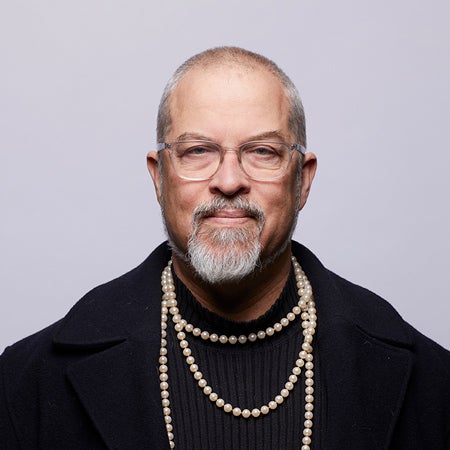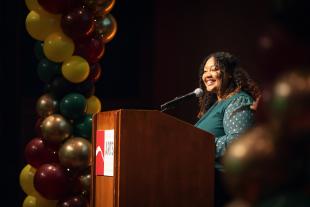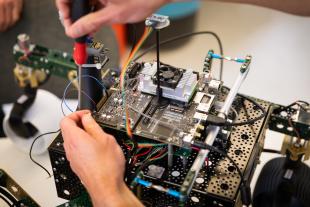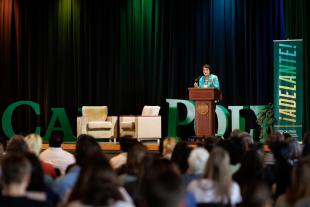Librarian Supports Diverse Student Entrepreneurs Through New Resource Guides

Kennedy Library’s Mark Bieraugel has always been a matchmaker.
For years, the librarian has connected students with the information they need to conduct research, launch a startup, or take the next step in a job search.
But recently, Bieraugel, who uses they/them pronouns, felt compelled to take that work one step further by creating a trio of non-curricular resource guides for entrepreneurs who identify as LGBTQIA, women, and Black, Indigenous and people of color.
“Just within the last couple years or so, I came out in a big way as a non-binary human being,” says Bieraugel. “I think part of this is to support the people that I’m interested in. They can look at this [guide] and understand that somebody cares about them to put this together.”
Bieraugel believes that while many student entrepreneurs are served by existing resources, some are likely looking for guidance more specific to their lived experiences. As a queer person who has spent years working in startups and large firms, they can personally relate to the challenges LGBTQIA people face in a business ecosystem that usually caters to straight, white men.
But they see the startup world as a potential haven for marginalized individuals.
“If you weren’t born into wealth, and honestly many queer folks aren’t, or they are disowned, the way to really make that million is to start your own company,” Bieraugel says. “The other piece is that you get to be your own boss — you don’t have to deal with toxic work relationships that you might have to elsewhere.”
Bieraugel curated the guides with information about financing, equity-focused accelerator programs, and thought leadership across different industries as a way to inspire budding business leaders.
It’s no coincidence that much of the information centers around money. Data proves that entrepreneurs of color and women founders continue to receive a fraction of the capital available to other entrepreneurs. Queer founders, especially women in the LGBTQIA community, struggle to secure funding compared to other folks, according to research from organizations like Start Out. Many are less likely to disclose their gender or queer status to potential finance partners.
“We want people to be genuine, passionate and feel comfortable with the people who are going to give them money,” says Bieraugel, especially when that funding guarantees some control over a new company.
A contingent of investment and venture capital firms now actively seek to support a greater diversity of founders, which Bieraugel highlights throughout the guides.
“I worked in the corporate world for many years and sort of had this professional façade,” Bieraugel says. Now, they approach their role in the Cal Poly community with the perspective of an entrepreneur determining their unique value proposition: “What do I bring to Cal Poly that few people can or want to do?”
Bieraugel, who co-authors research analyzing the startup environment and speaks to business classes about leveraging research tools, also partners regularly with programs on campus like Career Services. They collaborated with Career Services to create resources for LGBTQIA job seekers, who may be navigating different industries and contemplating coming out during the hiring process.
Off campus, they have talked to major employers like Mojang Studios, a Microsoft company behind the Minecraft video game, about ways to foster a more inclusive work environment for non-binary folks. They emphasized that little things can make a big difference.
“It’s really about making a place that’s comfortable for people to be themselves,” observes Bieraugel. “It’s not about doing a lot of different things. It’s integrating a few small things in to make people feel more comfortable, like pronouns for example.”
Bieraugel is one of several librarians and Kennedy Library staff who aim to shine a light on potential bias embedded in trusted information sources by being more transparent in other library guides. The process, they say, is very complex.
“Library guides created for curriculum don’t really surface how white-dominated the authors are, who owns the databases, how the algorithms are restrictive or racist,” they say. “We’ve begun to look at that to say, ‘how we can surface that information?’”
After nearly a decade at Cal Poly, Bieraugel recognizes that their work and their willingness to share their personal journey are critical facets of the university’s collective community, even if they never know how many LGBTQIA folks they impact.
“I feel it’s important for me to do it,” says Bieraugel. “Our students deserve us to be ourselves and to see the complexity of this world. If not, everybody is the same in the business world and the academic world.”




